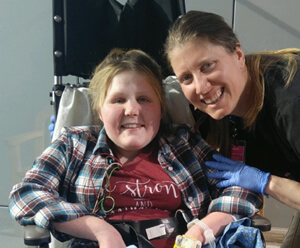Young Patient with Complicated Illness Helped to Thrive
 |
| Molly Brenner and one of her physical therapists at Saint Joseph Hospital. |
Cindy Brenner experienced many parents’ worst nightmare when her 14-year-old daughter, Molly, was diagnosed with a brain tumor on her pituitary gland.
Despite developing challenges with her vision, endocrine system and adrenal function, “Molly plugged along and was doing OK,” Cindy said.
Molly’s condition worsened, though, when she began to experience difficulty breathing and sleeping. In September 2015, she lost consciousness and had a seizure. Just months later, on a family vacation to St. Croix, she had to be airlifted to a hospital in Miami.
Molly spent her 18th birthday in the hospital, where doctors discovered bleeding in her lungs. “As a mother, there’s a sense of frustration and desperation and helplessness,” Cindy said. “We were trying to find answers for her.” So were Molly’s doctors, but her unique combination of symptoms was proving difficult to diagnose. The Brenners’ primary care physician in Kansas suggested they visit National Jewish Health.
Complex Case Becomes Life-Threatening
In the summer of 2016, Molly began seeing Rebecca Keith, MD, a pulmonologist at National Jewish Health. During a follow-up visit in December, Molly’s condition became so poor and her oxygen level so low that she was admitted to Saint Joseph Hospital.
“Thank goodness for our primary care physician sending us here,” Cindy said. “No one else would figure out what was going on with Molly. They literally saved her life.”
To treat the hemorrhaging in her lungs, Molly’s physicians performed a plasma exchange. As her condition worsened, doctors told Cindy they were running out of options and that her daughter might not survive. While in the intensive care unit (ICU) at Saint Joe’s, Molly's heart stopped beating — twice. “It was not one of our better Christmases,” Cindy said. Performing a Christmas miracle of sorts, doctors twice revived Molly, but she continued to get sicker.
“Molly’s case was more complicated than the average patient we see,” said Barbara Goldstein, MD, a rheumatologist who treated Molly at National Jewish Health.
“There’s not really a name for what she has,” Dr. Keith said. She explained that vasculitis, a rare group of diseases that cause inflammation of the blood vessels, comes closest to describing Molly’s diverse range of conditions. There are many types of vasculitis and they vary greatly in symptoms and severity, making the disease especially difficult to diagnose and treat.
Collaboration and Partnership Make the Difference
“The key in treating Molly was our multidisciplinary approach,” Dr. Goldstein said. Being able to confer regularly with Dr. Keith, she said, was critical to developing a treatment plan.
Dr. Goldstein and Dr. Keith both credit the involvement of National Jewish Health intensivists Ken Lyn-Kew, MD; Howard Saft, MD; Peter Stubenrauch, MD; and James Woodrow, MD, as well as the expertise of the ICU doctors and nurses at Saint Joseph Hospital.
“We couldn’t have done it without them,” Dr. Keith said.
Cindy agrees that the relationship between National Jewish Health and Saint Joseph Hospital was critical to her daughter’s recovery. “It was extremely important that we could still see her doctors from National Jewish Health while at Saint Joseph Hospital. That relationship was huge in Molly’s recovery. The doctors, nurses, physical therapists, everyone at Saint Joseph’s was top-notch,” Cindy said. “They handled it like no one’s business. We were definitely there for a reason.”
From the ICU to On Her Own
Molly continues to visit National Jewish Health for monthly chemotherapy treatments, but her overall health and quality of life have improved dramatically.
“She has bounced right back,” Dr. Goldstein said.
Only months after being in the ICU, Molly is thriving. She is taking classes at the Kansas State School for the Blind and Kansas City Community College, where she is studying technology and public speaking.
Showing a wisdom and resilience beyond her years, Molly said, “It can kind of be overwhelming at times, but I’ve learned that if I keep going, don’t give up and keep trying, it will eventually get better.”

